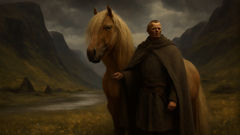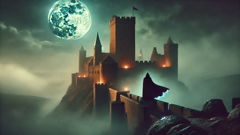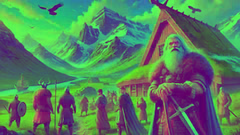Introduction
Beneath the wide, iron-grey skies of eastern Iceland, valleys roll out in solemn procession between craggy mountains. Here, the wind sings in the birch and willow groves, and the rivers run swift and cold, threading their way past scattered farmsteads and turf-roofed halls. In this land, where the sun lingers long in summer and vanishes for weeks in winter, the Norse spirit thrives on hardship and on honor. It’s a place where every man’s name echoes down the generations, where the smallest slight or the gravest kindness can set the course of fate. Among these valleys, at the close of the ninth century, the gods were still worshipped in secret groves and at sacred cairns. Chieftains—goðar—held sway, leading not just through power but through their role as priests, binding the land’s people to ancient rituals and to the will of the gods. Among the many goðar of this age was Hrafnkell Hallfreðarson, a man whose name would come to be spoken with both fear and awe. Proud, fiercely independent, and utterly devoted to Freyr, god of fertility and prosperity, Hrafnkell’s word was law in his valley. He was known not only for his cunning and strength in battle but also for his deep, sometimes dangerous sense of honor. His faith was embodied in a magnificent stallion named Freyfaxi—a horse so noble and spirited that Hrafnkell swore an oath: any man who rode Freyfaxi without permission would die by his hand. This vow, as ironbound as the rocks of the highland, became the axis upon which his fate—and the fate of all around him—would turn. The tale that unfolds is not simply one of bloodshed or vengeance; it is a story of how oaths can bind and break, how pride can lead men to ruin, and how even in a world ruled by swords and sagas, justice can take on many forms. In the long shadows of Iceland’s mountains, as storms gather and feuds ignite, the saga of Hrafnkell, Freyr’s godi, begins—etched forever in the memory of the land.
The Oath and the Stallion
Hrafnkell Hallfreðarson’s lands spread across the Adaldalur valley, a region of green meadows and shadowy woodlands watered by the icy rivers that tumbled from the highlands. Here he ruled with an iron will, respected and feared in equal measure. He was a man shaped by the old ways: generous to his kin, relentless against his enemies, and unwavering in his worship of Freyr. Of all his possessions, none was so treasured as Freyfaxi, the stallion with a coat as bright as the dawn and eyes that gleamed with uncanny intelligence. Freyfaxi was not just a horse; he was an emblem of Hrafnkell’s bond with Freyr, the god whose favor brought fertility to the land and fortune to its people.
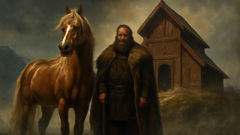
Hrafnkell built a shrine to Freyr above his farmstead, a timbered hof set on a low hill, where offerings of mead and bread were made at every season’s turning. He had raised Freyfaxi from a foal, and the horse had grown into a creature of legend—stronger, swifter, and more beautiful than any in the east. Riders came from distant valleys just to glimpse the stallion. Children spun tales of Freyfaxi’s might, whispering that he could sense the will of the gods. Yet Hrafnkell’s devotion took a darker edge. He swore a sacred oath: let any man who dared ride Freyfaxi without his leave pay for it with his life. This oath was not made lightly, nor was it spoken in secret. Hrafnkell’s neighbors heard it at feasts, his kin heard it by the hearth, and word of it reached every farmstead in the valley.
The seasons turned, harsh winters softened by fleeting summers. Hrafnkell’s rule was rarely challenged. Yet in a neighboring district, a man named Thorbjörn and his son Einar struggled to eke out a living on poor soil. Einar, a youth of bright mind and restless spirit, found work as a shepherd in Hrafnkell’s valley. The arrangement was simple: tend to the flocks and earn a wage, nothing more. Einar was warned—by his father and by the other shepherds—never to touch the chieftain’s stallion. Still, as the months passed, Einar’s admiration for Freyfaxi grew into longing.
One morning, thick fog rolled over the valley, cloaking pasture and hillside alike. Einar, seeking lost sheep, realized the only way to save the scattered flock before wolves found them was to ride. The only mount at hand was Freyfaxi, grazing near the boundary stones. Einar hesitated, recalling the deadly oath. But necessity won; he mounted Freyfaxi and swept across the misty field, the stallion running as if he sensed the urgency. Sheep gathered, Einar returned, trembling but triumphant. Yet fate had marked that ride. Freyfaxi, loyal to Hrafnkell, galloped straight to his master’s door and neighed until Hrafnkell emerged. One glance at the sweat-soaked flanks told Hrafnkell all he needed to know. Einar confessed with tears and pleading, but the chieftain’s vow was unyielding.
Hrafnkell took no pleasure in what followed. He summoned his men, pronounced Einar’s fate, and led him to the river’s edge. There, beneath the watchful gaze of mountain spirits and the silent judgment of the gods, Hrafnkell fulfilled his oath. Einar’s body was left for his kin to find. The valley shuddered with sorrow and outrage. Thorbjörn, Einar’s father, swore that Hrafnkell would answer for this—no matter how long it took, no matter what price must be paid.
Vengeance in the Valley
Word of Einar’s death spread like wildfire across the valleys. Some whispered that Hrafnkell was a monster, more god than man in his devotion, while others claimed he was simply upholding his word. Thorbjörn was left broken—his only son dead, his family’s hope extinguished. But the Norse spirit is not easily cowed by grief. Thorbjörn began a tireless quest for justice, traveling from farm to farm, from one chieftain’s hall to another, seeking allies who would help him challenge Hrafnkell’s power.
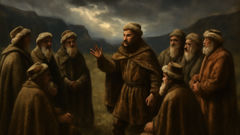
Most who heard his plea turned away. Hrafnkell’s reputation was too formidable, his wealth too great, and few wished to stand against a godi so deeply blessed by Freyr. Yet Thorbjörn’s persistence found a foothold in Sámr, his kinsman by marriage. Sámr was clever, ambitious, and unafraid of challenging tradition. Together they gathered what support they could—no great army, but enough men to bring a case before the regional Althing, the ancient assembly where disputes were settled and justice declared.
The journey to the Althing was long and cold, a procession of men carrying sorrow and anger across the wild highlands. Before the assembly, Thorbjörn laid out his case: Hrafnkell had sworn a cruel oath and killed Einar over a single misstep. The elders listened, the lawspeakers weighed the matter, and Sámr’s silver tongue found purchase where Thorbjörn’s grief could not. In a rare judgment against a powerful godi, the assembly ruled that Hrafnkell’s act was unlawful—a violation of the deeper bonds that held their fragile society together.
Sámr led a force to Hrafnkell’s farmstead at dawn. The chieftain’s men, surprised and outnumbered, surrendered quickly. Hrafnkell himself was seized and brought before Sámr. Expecting death, Hrafnkell instead heard an unexpected sentence: exile from his own lands, his wealth and title stripped, his hall given over to Sámr. Freyfaxi, too, was seized—no longer the symbol of Hrafnkell’s divine favor, but a prize taken by his enemies.
Sámr rode Freyfaxi through the valley, making a display of his victory. Yet not all in the land approved. Some believed the Althing’s judgment had broken a sacred balance—punishing a chieftain for keeping his oath. Others saw it as proof that no man, not even a godi, stood above the law. Thorbjörn found solace in the verdict, but the wound in his heart could not be so easily healed. Hrafnkell, meanwhile, wandered the wilds, stripped of everything but his pride and his memories. At night he dreamed of Freyfaxi, of the rituals and feasts now lost to him, of a power that had slipped like water through his fingers.
But exile in Iceland is never permanent. Hrafnkell’s kin, loyal even in disgrace, sheltered him in distant valleys. He worked their fields, ate at their tables, and watched as his old lands changed hands. Sámr, for all his cunning, proved an unsteady ruler. His men grew restless, his judgments harsh. The valley grew uneasy, caught between fear of the old godi and disappointment in the new lord. As for Freyfaxi, he fared no better—restless under Sámr’s hand, the stallion pined for his true master, refusing food, breaking fences, turning wild. In time, Sámr saw the horse as a burden, not a trophy. One winter morning, in frustration, he ordered Freyfaxi driven into a ravine, where the great horse perished among the stones.
Return and Reckoning
Years passed. Snow thawed and froze again over the graves of old oaths and new rulers. Hrafnkell waited and watched, patience growing in place of old pride. He labored alongside his kin, learned humility in hardship, and saw how swiftly fortune could turn. The gods, he realized, could be fickle—or perhaps the world itself simply cared little for men’s ambitions. Yet in those silent years, he never forgot his loss nor the valley that had once been his.
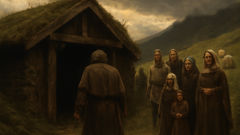
Change came quietly. Sámr’s harsh rule bred enemies as swiftly as it had claimed power. Those who had prospered under Hrafnkell now looked back on his reign with longing. Whispers grew: maybe the old godi had been wronged; maybe justice, once served, had soured into new injustice. Hrafnkell saw his chance and took it not with swords but with careful alliances. He reconciled with old rivals, helped neighbors in need, and slowly rebuilt his reputation. Soon enough, the valley was ready to welcome him back.
When Hrafnkell returned, it was not in triumph but in somber procession. His kin gathered at the old hall—now in disrepair—and watched as he took up the tasks he had once commanded. There were no grand pronouncements, no calls to arms. Instead, Hrafnkell mended fences, settled disputes, offered generous feasts. The valley responded: families brought gifts, former adversaries sought his counsel. Bit by bit, Hrafnkell regained his lands and his people’s trust.
Yet some wounds could not be undone. Freyfaxi was gone; Einar’s ghost lingered in the shadows of every pasture. Hrafnkell, changed by exile and loss, set aside his old oaths. He rebuilt the hof to Freyr not as a place of fear but as a sanctuary for peace and prosperity. The rituals continued, but the threat that had once hung over every feast and gathering faded. Hrafnkell’s power now rested not on terror or pride but on wisdom and generosity. He became known as a fair judge, a protector of the weak—a man whose story warned against letting vengeance or arrogance rule the heart.
Sámr, seeing his own support vanish, left the valley quietly. Thorbjörn, though still mourning his son, accepted Hrafnkell’s offers of peace. The feud was laid to rest—not forgotten, but transformed into a lesson that would echo down through generations. And so it was that Hrafnkell, once feared as a ruthless chieftain, ended his days as a respected elder. His saga was sung not only as a tale of blood and retribution but as a story of transformation—a reminder that even in the coldest valleys of Iceland, justice can be found in mercy as well as in law.
Conclusion
The saga of Hrafnkell, Freyr’s godi, endures as one of Iceland’s most haunting tales—a story woven from the fibers of pride, vengeance, and hard-won wisdom. What began as a simple oath—a chieftain’s vow to protect what he cherished—grew into a storm that swept up all in its path. The valley bore witness to both cruelty and mercy, to the darkness that comes when men let pride shape their fate and to the quiet redemption found in humility. Through exile and loss, Hrafnkell discovered what true leadership means: not ruling by fear or by rigid devotion to old oaths, but by guiding others through fairness and understanding. His journey from feared chieftain to wise elder reminds us that justice is rarely simple; it is forged in the fires of suffering and tempered by the willingness to change. Long after the last echoes of hoofbeats faded from the valley, the story of Hrafnkell lived on—in songs by winter fires, in the whispered warnings of parents to children, in the memory of a land that has always demanded both strength and compassion from its people.

